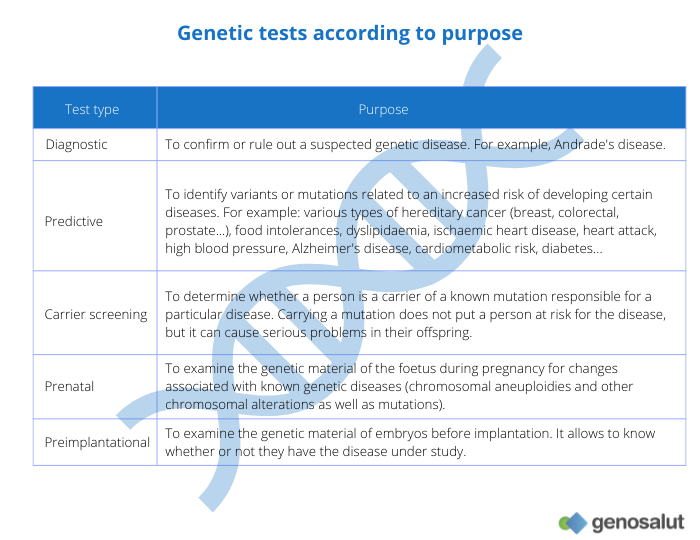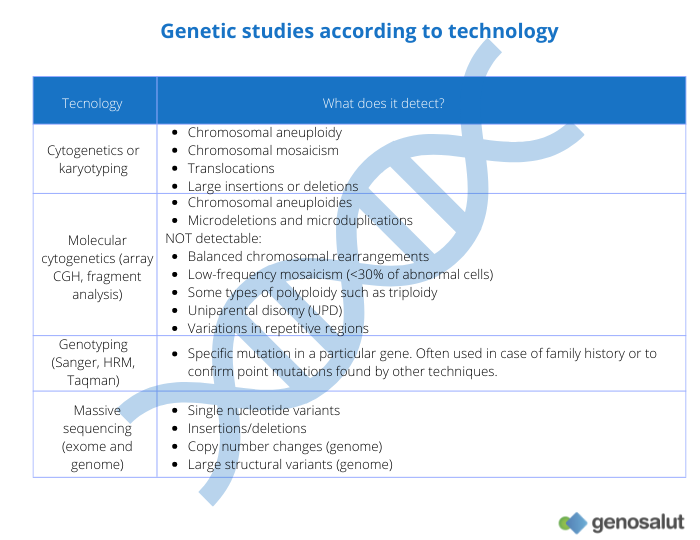What is genetic testing?
A genetic test or genetic screening is a test carried out in a laboratory to analyse genes. Genes are the instructions contained in the DNA that we inherit from our parents. Sometimes these instructions contain variants or defects known as mutations that can predispose, be the cause or one of the causes of health problems and various diseases.
Genetic testing: what is it for?
The results obtained in a genetic test can be useful for the prevention, diagnosis and prognosis of a disease:
● Prevention: It helps to identify changes that predispose to certain diseases.
● Diagnosis and prognosis: A pathology can have a different course depending on the mutation that causes it (in whole or in part).
● Helps to determine the diagnosis and prognosis of the disease.
● Treatment and therapy: Can determine the most effective treatment to follow.
● Family screening and heritability: A genetic test determines the risk of your family members having the disease or being carriers.
What types of genetic tests are there?
Genetic tests can be classified on the basis of different criteria. For example, based on their scope, they can be:
● Diagnostic testing: Performed in a person who presents certain symptoms to confirm or exclude a genetic pathology.
● Predictive testing: Performed in healthy people at the time of the study. The reason for carrying out this study may be to have a family history or the interest in taking a proactive attitude towards health (preventive and personalised medicine).
● Carrier screening: To find out whether a person is a carrier of a mutation responsible for a particular disease. This mutation does not confer a risk of suffering from it, but it does to their offspring.
● Prenatal testing: This is carried out during pregnancy to find out if the foetus is affected by a genetic pathology.
● Preimplantational testing: Performed on the cells of an embryo before implantation in the context of assisted reproduction. It is used to determine whether the embryo is affected by a pathology previously identified in its parents.

They can also be classified on the basis of the technologies used and the analysis possibilities of each of them:

What diseases does a genetic test detect?
The diseases that a genetic test can detect are necessarily linked to the purpose of the test and also to the technology used.
Thus, genetic studies can serve to:
● Confirm a diagnosis due to previous symptomatology. These are usually monogenic diseases that manifest themselves in adulthood. For example, Huntington’s disease, Andrade’s disease…
● Predicting whether we will develop a disease. As before, these are usually monogenic diseases that manifest in adulthood. The person does not yet have symptoms but has a family history of the disease. For example Huntington’s disease, Andrade disease…
● Predict whether we have a genetic predisposition to develop certain diseases or health problems such as food intolerances. In this case, these are multifactorial diseases, which generally involve several genes and also the environment. These include: various types of hereditary cancer (breast, colorectal, prostate, etc.), food intolerances (lactose, fructose, coeliac disease, etc.), dyslipidaemia, ischaemic heart disease, heart attack, high blood pressure, Alzheimer’s disease, cardiometabolic risk, diabetes, etc. They are also used to check your body’s compatibility with certain drugs (pharmacogenomics) and to adapt nutrition according to your genes, to be healthier and to take measures to prevent diseases (nutrigenetics and nutrigenomics).
When is it advisable to do a genetic test?
Genetic tests can be performed for multiple reasons: from a need for knowledge as part of a preventive attitude, due the presence of a family history, due to symptoms suspicious of a genetic disease… In other words, although within the framework of prevention, anyone can undergo a genetic study, there are a series of aspects to consider before undergoing one and it is advisable to ask a specialist beforehand. This person can explain the risks and benefits (emotional and physical health) of these tests. However, in some cases these tests are particularly advisable:
● If there is a history of medical history in your family. For example, if there have been several cases of cancer, cardiovascular or neurodegenerative diseases.
● Difficulty in achieving pregnancy or infertility, if you plan to have children with someone with whom you are related, or if you are over 35 years of age.
● If you are at high risk of developing a disease.
● If there has been a family history of newborns with a congenital disease.
● If there is a possibility that you could pass the disease on to your offspring.
Our genetic report
An accurate and quality report is essential in genetic medicine. We provide a detailed description of the most important findings as well as differential diagnoses. Our report includes:
● Description of the method used
● Results of the variants identified
● Results with differential diagnoses (if applicable)
● References to publications
● Recommendations for further analysis (if applicable)
At Genosalut we have a wide range of preventive, predictive and diagnostic genetic tests for monogenic and multifactorial diseases.
If you like our blog, subscribe to our newsletter


